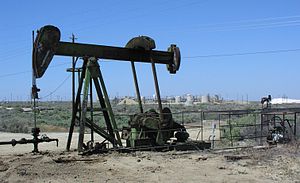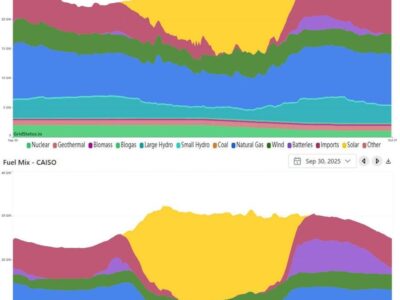California Enacts Nation’s First Comprehensive Fracking Law—And Everyone’s Unhappy
Controversial But Promising, SB 4 Constitutes Tangible Progress on the Fracking Front
 Late last month the California Legislature passed, and Governor Jerry Brown signed into law, the nation’s first comprehensive system of regulating hydraulic fracturing, the oil and gas drilling technique more commonly known as “fracking.” It turns out that no one–the oil and gas industry, surface landowners or environmentalists–is particularly happy with the new law. And that actually suggests that, on balance, the new California fracking law represents a positive development for environmental law and policy.
Late last month the California Legislature passed, and Governor Jerry Brown signed into law, the nation’s first comprehensive system of regulating hydraulic fracturing, the oil and gas drilling technique more commonly known as “fracking.” It turns out that no one–the oil and gas industry, surface landowners or environmentalists–is particularly happy with the new law. And that actually suggests that, on balance, the new California fracking law represents a positive development for environmental law and policy.
The new legislation, SB 4, was authored by one of the California Legislature’s strongest environmental voices–State Senator Fran Pavley. Pavley is generally considered a rock star in state, national and global conservation circles. (She wrote the nation’s first law requiring greenhouse gas emission limits for motor vehicles in 2002, was a principal author of AB 32, California’s Global Warming Solutions Act of 2006, and sponsored landmark water legislation in 2009.) But Pavley’s leadership this year on the fracking front has strained her relationship with the environmental community a bit, at least for the moment.
Fracking involves the injection of fluids and other materials into underground oil and gas wells at high pressure, cracking underground rock formations and extracting previously inaccessible oil and gas deposits. The technology has been around in primitive forms for many decades. What makes modern fracking both far more effective and controversial is that current fracking technology involves injection of a combination of water, sand and a mixture of often-toxic chemicals. Current-generation fracking techniques, combined with other advances in underground drilling technologies, have been wildly successful in recent years to increase domestic production of oil and gas production. (Indeed, the Wall Street Journal reported yesterday that, largely as a result of the fracking boom, the U.S. “is poised to overtake Russia as the world’s largest producer of oil and natural gas this year, a startling shift that is reshaping energy markets and eroding the clout of traditional pretroleum-rich nations.”) They have launched a domestic energy development boom that has dramatically improved America’s balance-of-payments outlook, and greatly aided in reducing the nation’s longstanding dependence on unreliable foreign oil and gas imports.
Additionally, the environmental community can–or at least should–welcome several other consequences of the fracking boom: the increasing availability of domestic natural gas reserves is important as a relatively low-polluting “bridge fuel” to transition to a domestic energy portfolio that relies primarily on renewable energy sources. And the fact is that the new abundance of relatively inexpensive U.S. natural gas has done far more to displace and reduce coal as a U.S. energy source than have all the protestations of the conservation community.
But fracking has also become enormously controversial as a result of its documented, adverse environmental effects–including widespread groundwater contamination, negative wildlife impacts, and increased conventional air and greenhouse gas pollution. In the absence of any comprehensive regulatory scheme–until now–fracking controversies have generally played out in the courts and political arena.
With this backdrop, the enactment of SB 4 represents a very big deal. The legislation directs California’s Division of Oil and Gas to develop the nation’s first-ever, statewide permit system to regulate fracking and related drilling technologies, and to have that system in place by January 1, 2015.
Perhaps wisely, the legislation provides few details as to how California regulators should structure the new fracking permit system. (The California Legislature similarly delegated broad discretion to the California Air Resources Board under AB 32 to devise the program for California to reduce the state’s aggregate greenhouse gas emissions, a decision which in hindsight has proven exceedingly wise.)
One particular feature of SB 4 that is a most positive development concerns trade secrets. Many oil and gas firms have in the past refused to disclose the chemical composition of their fracking fluids to government or the interested public, claiming that this information constitutes proprietary trade secrets not subject to public disclosure. By contrast, SB 4 presumes such information can and should be disclosed, and places the burden squarely on the industry to prove to state regulators–and the courts, if necessary–that the composition of their fracking fluids truly qualifies as a trade secret. Leaving aside the larger question of whether trade secret laws should ever be allowed to trump public health and safety concerns, this is a welcome reform.
Conversely, the biggest current controversy over California’s new fracking law is how it relates to California’s “little NEPA” statute, the California Environmental Quality Act. 11th hour amendments to SB 4 made clear that fracking can continue unregulated at the state level until the new SB 4 permit scheme takes effect in 2015. In the meantime, the Division of Oil and Gas is directed by the law to “conduct” an environmental impact report under CEQA “to provide the public with detailed information regarding any potential environmental impacts” of fracking in California. But that language is ambiguous, at best: does it mean that state regulators are supposed to prepare some sort of “master” or “program” EIR studying California fracking practices generally? Or is it mandating EIRs for some or all fracking projects on an individualized basis during this interim period? From the statutory language, it’s nigh impossible to tell.
SB 4’s inclusion of these confusing CEQA provisions caused a number of California environmental groups to renounce their prior support for the bill at the conclusion of this year’s legislative session. In a statement accompanying his signing of SB 4, Governor Jerry Brown obliquely referred to some drafting ambiguities that he believes require fixing through 2014 clean-up legislation. (My strong hunch is that the Governor was referencing the bill’s vague CEQA provisions in his comments.) For her part, Senator Pavley has announced that she’s amenable to such revisions to SB 4. Those are most welcome developments.
In the meantime, all eyes are on the California Division of Oil and Gas, a small and previously-obscure state agency that has generally avoided public scrutiny over the years. Just as CARB was thrust into prominence for its work to implement AB 32, and the Department of Toxic Substances Control achieved similar attention for its recent launch of California’s controversial “Green Chemistry” initiative, so too will there be tremendous media, industry and public scrutiny focused on the Division of Oil and Gas as it develops the nation’s first statewide program to regulate oil and gas fracking. Let’s hope those California regulators prove to be up to the task.
Reader Comments
7 Replies to “California Enacts Nation’s First Comprehensive Fracking Law—And Everyone’s Unhappy”
Comments are closed.






I agree that the trade secrets and disclosure provisions are very positive. Perhaps even more so than your article suggests.
You note that “SB 4 presumes [chemical composition] can and should be disclosed, and places the burden squarely on the industry to prove to state regulators–and the courts, if necessary–that the composition of their fracking fluids truly qualifies as a trade secret.”
In fact, SB 4 specifies that the actual chemicals in fracking fluid additives are NOT allowed to be trade secrets. Only their concentrations can be claimed as trade secrets. And the chemicals must be disclosed in the permit application – not just after the fact.
It is doubtful that the oil industry will want to drill in California. Californians should pay $9 per gallon for gasoline and avoid fracking altogether.
The oil and gas industry already does and will continue to drill in California. This law is very similar to requirements placed on the industry in Texas, Oklahoma, Colorado, Illinois, Pennsylvania, New Mexico, Wyoming, etc. through the regulatory process.
Regardless of fracking, California should set an example for all Americans and give citizens an incentive to fight climate change by recognizing the true ecological and societal cost of fossil fuel. Fix the price of gasoline at $12/gallon with an annual adjustment upwards. Countless lives could be saved from the ravages of carbon dioxide and premature death. Fracking = death, please save us.
The big secret here is that “fracking fluid recipes” are a red herring used to facilitate the dumping of toxic waste. Oil companies use “trade secret” laws to hide this dumping. The idea that a company could develop a recipe with 100 chemical is utter nonsense. How can it be a “trade secret” when it is impossible to prove that the recipe of 100 chemicals has any advantage? Think about how many combinations must be tested to arrive at 100 chemicals in a “trade secret”. Even if you don’t worry about relative amounts, we are talking 2 to the power of 100, or 1,000,000,000,000,000,000,000,000,000,000 combinations. All the computers in the world working since the beginning of time couldn’t test this many combinations. Even if you had access to all the planets in the universe since the beginning of time, you couldn’t drill and test this many combinations. It’s just nonsense for them to claim the need for trade secret protection. If you can’t demonstrate one recipe is any better than another, why does it need trade secret protection? There is only one answer – to hide the dumping of toxic waste. Since all injection wells are into rock with different chemical composition, fracking fluid is immediately contaminated with other chemicals that change the original recipe. The original recipe can’t be maintained. You can’t simulate on a computer how such a mixture will behave. Fracking trade secrets are a fraud. Any politician who buys into this nonsense is facilitating a cover up of toxic waste dumping.
Dear Dr. James McFadden,
As you know, crude oil contains many very scary toxic substances. Yesterday I paid $2.89/gallon for gasoline here in Texas. That will never ever happen in California. California is doomed to misery, delusions, squalor and fear.